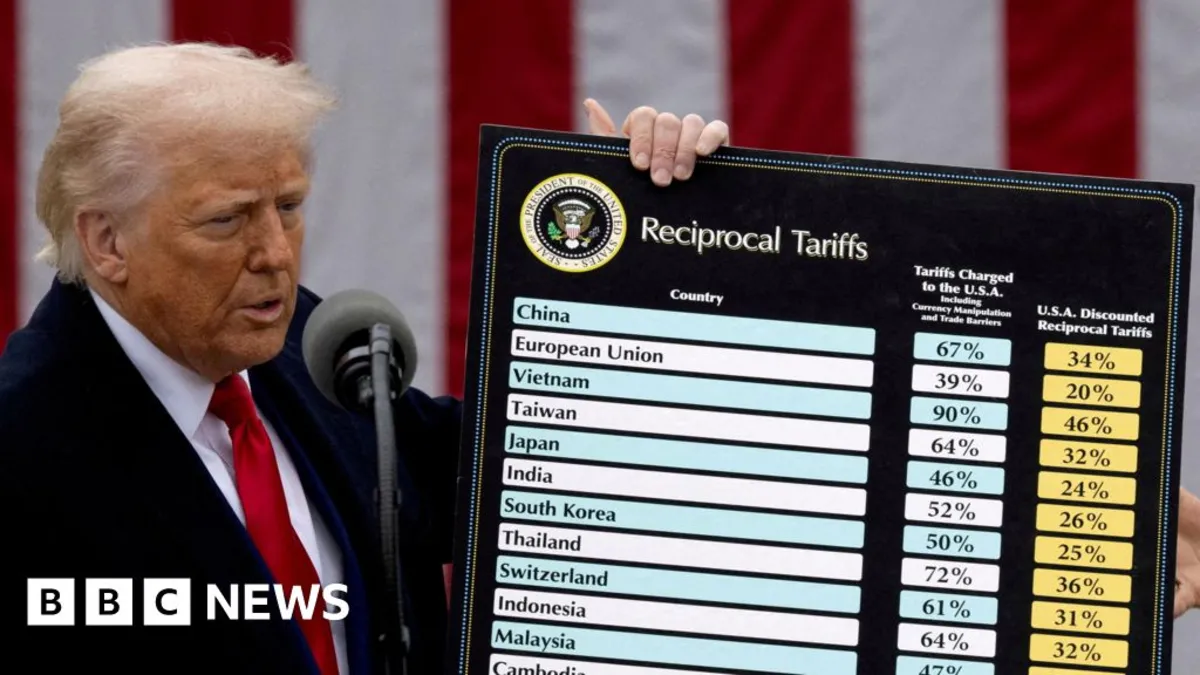
In what may be the most significant showdown in Donald Trump's trade war, the Trump administration is set to face the US Supreme Court on Wednesday. The case pits the administration against small businesses and several states that argue the majority of the tariffs imposed by the government are illegal and should be overturned. A ruling in favor of these challengers could disrupt Trump's entire trade strategy, including the extensive global tariffs he initiated in April.
If the Supreme Court sides with the businesses, it could lead to the government needing to refund billions of dollars collected through these import taxes. The final verdict from the justices may take months as they meticulously review arguments and deliberate on the case, ultimately leading to a vote with significant implications for the nation's economy.
Trump has framed this legal battle in dramatic terms, suggesting that a loss would severely limit his capacity for trade negotiations and threaten national security. In a statement on Sunday, he expressed his desire to attend the hearing but opted out to avoid being a distraction. "It's not about me, it's about our country," Trump stated. He has previously warned that failing to win this case could leave the U.S. in a precarious economic state for years.
The stakes are equally high for many businesses, both in the U.S. and globally, that have been adversely affected by rapidly changing trade policies. For instance, Learning Resources, a U.S. toy retailer primarily sourcing products overseas, is facing a staggering $14 million in tariffs this year—seven times what it incurred in 2024, according to CEO Rick Woldenberg. He highlighted the turmoil caused by these tariffs, stating that the company has had to shift the manufacturing of numerous products since January.
As the Supreme Court deliberates, it must address a broader question regarding the extent of presidential power. Legal analysts indicate that predicting the justices' decision is challenging, but a ruling favoring Trump could grant him—and future presidents—broader authority over trade policies. The case centers on tariffs enacted under the 1977 International Emergency Economic Powers Act (IEEPA), which the Trump administration utilized for its expediency and flexibility.
Initially, Trump invoked the IEEPA in February to impose tariffs on goods from China, Mexico, and Canada, citing drug trafficking as an emergency. He later expanded these tariffs in April, claiming an extraordinary threat posed by the U.S. trade deficit. However, many opponents contend that while the law allows the president to regulate trade, it does not explicitly mention tariffs, asserting that such powers rest with Congress as per the U.S. Constitution.
Members of Congress from both parties have voiced their concerns, stating that the Constitution assigns the authority to impose tariffs to them. A coalition of over 200 Democrats and a Republican senator, Lisa Murkowski, submitted a brief to the Supreme Court arguing that the emergency law does not authorize the president to use tariffs as leverage in trade negotiations. Recently, the Senate also passed symbolic resolutions rejecting Trump's tariffs, including one aimed at ending the national emergency he declared, although these resolutions are unlikely to pass in the House.
Three lower courts have already ruled against the Trump administration. Following the Supreme Court's hearing on Wednesday, a decision is expected by January, although it could extend to June. The ruling will have significant implications for approximately $90 billion in import taxes already paid, which accounts for roughly half of the tariff revenue collected by the U.S. this year through September, as noted by Wells Fargo analysts. Trump's officials have cautioned that this sum could balloon to $1 trillion if the court delays its decision.
Businesses like Cooperative Coffees are prepared to seek reimbursement if the court mandates refunds. However, they acknowledge that such financial recovery would not compensate for the ongoing disruptions. Bill Harris, co-founder of Cooperative Coffees, emphasized the strain these tariffs have placed on operations, forcing them to secure additional lines of credit and raise prices to cope with lower profit margins. "This is an energy drain like I've never seen," he remarked, highlighting the pervasive stress these tariffs impose on day-to-day operations.
The White House has indicated that should it lose the case, it may implement tariffs through alternative means, such as a law permitting the president to impose levies of up to 15% for a duration of 150 days. However, this route would offer businesses some respite, as it requires formal processes that take time, unlike the immediate actions seen in the past.
Trade lawyer Ted Murphy noted that the critical issue extends beyond financial implications; it encompasses the overall process of imposing tariffs. He pointed out that Trump's administration has previously enacted tariffs with little notice, raising concerns among businesses about future unpredictability.
While the court's ruling remains uncertain, recent history shows a tendency for the justices to strike down significant policies perceived as executive overreach. However, the Supreme Court has also shown deference to presidential authority in matters of national security. Analysts like Greta Peisch believe that the court has various pathways for its ruling, while Adam White anticipates a decision to overturn the tariffs without addressing broader questions of national emergencies.
Internationally, businesses such as Chocolats Camille Bloch in Switzerland are feeling the pinch from the U.S. tariffs, absorbing increased costs to maintain their market presence in the U.S. Chocolatier Daniel Bloch expressed hope that a Supreme Court ruling against the Trump administration would alleviate the burdens placed on his business.